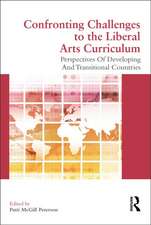The Politics of Education Reforms: Globalisation, Comparative Education and Policy Research, cartea 9
Editat de Joseph Zajda, Macleans A. Geo-JaJaen Limba Engleză Paperback – 4 mai 2012
| Toate formatele și edițiile | Preț | Express |
|---|---|---|
| Paperback (1) | 638.11 lei 43-57 zile | |
| SPRINGER NETHERLANDS – 4 mai 2012 | 638.11 lei 43-57 zile | |
| Hardback (1) | 644.30 lei 43-57 zile | |
| SPRINGER NETHERLANDS – 4 feb 2010 | 644.30 lei 43-57 zile |
Din seria Globalisation, Comparative Education and Policy Research
- 24%
 Preț: 731.71 lei
Preț: 731.71 lei - 20%
 Preț: 753.41 lei
Preț: 753.41 lei - 18%
 Preț: 780.57 lei
Preț: 780.57 lei - 15%
 Preț: 643.84 lei
Preț: 643.84 lei - 15%
 Preț: 636.63 lei
Preț: 636.63 lei - 15%
 Preț: 636.80 lei
Preț: 636.80 lei - 15%
 Preț: 637.28 lei
Preț: 637.28 lei - 15%
 Preț: 642.83 lei
Preț: 642.83 lei -
 Preț: 389.11 lei
Preț: 389.11 lei - 15%
 Preț: 643.00 lei
Preț: 643.00 lei - 15%
 Preț: 583.45 lei
Preț: 583.45 lei - 15%
 Preț: 646.62 lei
Preț: 646.62 lei - 24%
 Preț: 694.97 lei
Preț: 694.97 lei - 18%
 Preț: 731.59 lei
Preț: 731.59 lei - 15%
 Preț: 644.82 lei
Preț: 644.82 lei - 18%
 Preț: 939.77 lei
Preț: 939.77 lei - 15%
 Preț: 635.31 lei
Preț: 635.31 lei - 18%
 Preț: 941.82 lei
Preț: 941.82 lei - 18%
 Preț: 994.39 lei
Preț: 994.39 lei - 18%
 Preț: 724.80 lei
Preț: 724.80 lei - 18%
 Preț: 886.43 lei
Preț: 886.43 lei - 18%
 Preț: 887.86 lei
Preț: 887.86 lei - 18%
 Preț: 777.35 lei
Preț: 777.35 lei - 15%
 Preț: 642.51 lei
Preț: 642.51 lei - 18%
 Preț: 781.45 lei
Preț: 781.45 lei - 18%
 Preț: 775.65 lei
Preț: 775.65 lei - 18%
 Preț: 938.66 lei
Preț: 938.66 lei
Preț: 638.11 lei
Preț vechi: 750.72 lei
-15% Nou
Puncte Express: 957
Preț estimativ în valută:
122.12€ • 127.16$ • 103.21£
122.12€ • 127.16$ • 103.21£
Carte tipărită la comandă
Livrare economică 10-24 martie
Preluare comenzi: 021 569.72.76
Specificații
ISBN-13: 9789400731486
ISBN-10: 9400731485
Pagini: 248
Ilustrații: XXII, 226 p.
Dimensiuni: 155 x 235 x 13 mm
Greutate: 0.35 kg
Ediția:2010
Editura: SPRINGER NETHERLANDS
Colecția Springer
Seria Globalisation, Comparative Education and Policy Research
Locul publicării:Dordrecht, Netherlands
ISBN-10: 9400731485
Pagini: 248
Ilustrații: XXII, 226 p.
Dimensiuni: 155 x 235 x 13 mm
Greutate: 0.35 kg
Ediția:2010
Editura: SPRINGER NETHERLANDS
Colecția Springer
Seria Globalisation, Comparative Education and Policy Research
Locul publicării:Dordrecht, Netherlands
Public țintă
ResearchCuprins
MAIN TRENDS AND ISSUES.- Neoliberalism, the New Imperialism, and the “Disappearing” Nation-State: A Case Study.- How Educational Systems Form and Reform.- Academic Capitalism in Japan: National University Incorporation and Special Zones for Structural Reform.- Globalisation and Higher Education Policy Changes.- The Emergence of the Local Management of Schools (LMS) in Israel: A Political Perspective.- Alternative Approaches on Society, State, Educational Reform, and Educational Policy.- EQUALITY, ACCESS AND DEMOCRACY.- Social Exclusion, Poverty, and Educational Inequity in the Niger Delta Region of Nigeria: Which Development Framework.- Constructing Worker-Citizens in/Through Teacher Education in Cuba: Curricular Goals in the Changing Political Economic Context.- The Reform of Chinese College English Teaching (CCET) in the Context of Globalisation.- Global Teacher Rec ruitment as a Challenge to the Goal of Universal Primary Education.- Power and Authority in School and Community: Interactions Between Non-Indigenous Teachers and Indigenous Teacher Assistants in Remote Australian Schools.- Deliberative Pedagogy and the Rationalization of Learning.
Textul de pe ultima copertă
This, the ninth in the 12-volume series Globalization, Comparative Education and Policy Research, focuses on the politics at play in the arena of education reform. As with the other publications in the group, this one features scholarly research into major areas of inquiry related to education and globalisation. Here, the research is focused on key debates in the politics of education reforms. Again, this volume offers researchers, practitioners and policymakers a state-of-the-art sourcebook of the very latest thinking on the subject.
Case studies are culled from places as diverse as Russia, where education reforms have attempted the wholesale remodeling of the former Soviet-style system characterised by top-down uniformism, to the Niger Delta, where it is argued that only non market-based approaches can combat the endemic social exclusion, poverty and social inequity. Japan’s evolving universities, Israel’s self-managing schools, and English teaching in Chinese colleges also feature. In addition to the site-specific research, contributors offer a number of in-depth analyses exploring issues at the interface of education theory and political philosophy. These include an examination of the dominant paradigms employed in critiquing education reforms and a discussion of the nexus between neoliberalism and policy change in higher education, in which it is argued that the continued existence and political importance of nation states makes their universities far from neutral sites of knowledge and knowledge construction.
Globalisation and competitive market forces have generated an upsurge in the knowledge industries that is having profound differential effects on educational institutions, an analysis acknowledged by this text. As educational organisations are compelled to embrace the corporate ethos of efficiency, accountability and profit-driven managerialism, the potential is created for further polarisation andsocio-economic divisions in society that may result in discontent and social conflict.
Case studies are culled from places as diverse as Russia, where education reforms have attempted the wholesale remodeling of the former Soviet-style system characterised by top-down uniformism, to the Niger Delta, where it is argued that only non market-based approaches can combat the endemic social exclusion, poverty and social inequity. Japan’s evolving universities, Israel’s self-managing schools, and English teaching in Chinese colleges also feature. In addition to the site-specific research, contributors offer a number of in-depth analyses exploring issues at the interface of education theory and political philosophy. These include an examination of the dominant paradigms employed in critiquing education reforms and a discussion of the nexus between neoliberalism and policy change in higher education, in which it is argued that the continued existence and political importance of nation states makes their universities far from neutral sites of knowledge and knowledge construction.
Globalisation and competitive market forces have generated an upsurge in the knowledge industries that is having profound differential effects on educational institutions, an analysis acknowledged by this text. As educational organisations are compelled to embrace the corporate ethos of efficiency, accountability and profit-driven managerialism, the potential is created for further polarisation andsocio-economic divisions in society that may result in discontent and social conflict.
Caracteristici
Explores conceptual frameworks and methodological approaches applicable in the research of education reforms, policy change and globalisation Examines central discourses surrounding the debate of education reforms, access and equity in schooling globally Illustrates how the relationship between education reforms and globalization affects current models and trends in schooling globally Demonstrates ideological imperatives of globalisation and its impact on trends in schooling around the world Evaluates the ambivalent and problematic relationship between the State, ideology, education reforms and outcomes in education globally Includes supplementary material: sn.pub/extras















